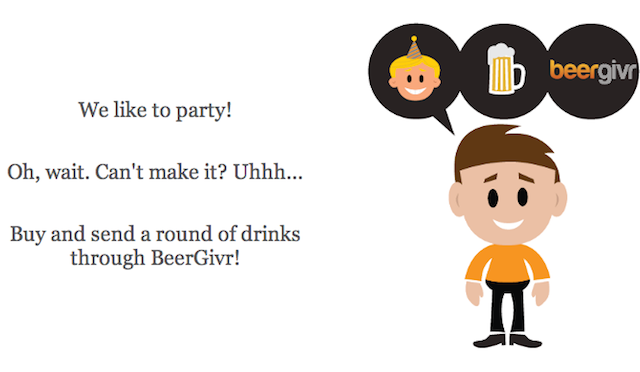
By Michael Cavanagh
I owe you one. It’s a fairly innocuous phrase, casually tossed around as a creative way of saying thanks. Just a means of expressing gratitude, nothing more. Certainly most people don’t actually think that you owe them one. Colleagues don’t keep tabs on the “ones” that you nonchalantly pledged. If they did, what exactly would you owe them? And who decides in what form “one” is paid? The question undoubtedly is shrugged off by most. Yet, after further contemplation, do we use it too loosely? Should we drop the frivolity and actually mean what we say. Sean Kennedy thinks so. And he even developed a way to make good on your promise.
The young entrepreneur displays the same talents as many of his contemporaries, harnessing available technology to innovate and deliver a useful product based on a real world need. With a background in Computer Science and Information Systems, Sean started his career as a “flying consultant.” His international globetrotting gave him invaluable experience as he forged strong relationships with co-workers from around the world. During those short periods of interaction “ones” were racked up and distributed, given and received regularly. For Sean, the importance of following through with the statement was real. And he paid in beer.
But the nature of his business precluded payment. Many of the “ones” he owed needed to be paid to colleagues in other countries. The guilt of not paying ate away at his conscious and he contemplated ways of settling the debt. Should he send a gift card? There was something too cold and robotic about a plastic token of appreciation. Should he send a “Thank You” card? Those cards were reserved for special occasions and, moreover, were usually tossed in the can after removing the check. So two years ago, as the frustration mounted, he decided to build a smartphone app that would solve his problem.
BeerGivr was launched as a prototype in 2011 and has since spread across Baltimore with over 20 bars (and one retail store) participating in the program. The app works as sort of a portable bar tab, to be filled by the “ones” owed to you by others. For example, if your co-worker saved your butt on a recent presentation or such, you could send them money for a beer, which they could redeem at any one of the eligible Baltimore establishments. If their favorite bar currently doesn’t participate in the program, or they don’t live in Baltimore, you can still send the gift and the money will be directly deposited in their PayPal account. For a better explanation, check out one of BeerGivr’s clever videos.
Sounds simple, right? Well, from a consumer’s perspective it is. One person sends money, one person receives it, and then uses it for beverages at the bar. Yet, from a developer’s standpoint, the hurdles, obstacles, and difficulties arose at nearly every turn.
The first challenge was the actual code that needed to be written, much too complicated to be explained by this technologically-handicapped writer. Suffice it to say, it took a concerted effort and substantial man-hours to complete.
The next aspect was the security of the system. With daily hacking attempts, which are to be expected with a monetized program, BeerGivr had to prove its firewalls were impervious to penetration. So far, it has defeated four major hacker attempts. And now that Sean had proven the app’s ability to work and to defend itself, the next component was to get people to use it and bars to incorporate it into their business. A classic Catch-22 ensued. Bar owners wanted to see how many people used the app before agreeing to accept redemptions while consumers needed a variety of bars to use it in. Fortunately, simplicity held the day.
For bar owners, there is no investment needed, no complex system of redemption, and, best of all, they don’t lose a dime on the transaction. Aside from a brief explanation to the bartender on how to scan the barcode displayed on the phone, bar owners really don’t have much to do. For consumers, there is a small premium to send a beer virtually. The sender will pay an extra 5 percent plus one dollar for every transaction. Most birthday cards cost more than that and we all know where they eventually end up.
Sean is betting that the originality and uniqueness of sending a gift through BeerGivr will catch on and drive its success. Thinking about it — that may be smart money. Gifts can be sent remotely and at the last minute.
Sean related a story of a father in Texas sending his son $50 for his 21st birthday with a message: “Be safe and enjoy” ““ now that’s an awesome birthday gift for a young lad about to sow his oats before facing the realities of adulthood.
Plus, BeerGivr is unique and memorable. Remember that $25 gift card to Crate & Barrel that your Aunt Betsy sent you? It’s still languishing in the junk drawer. But Aunt Betsy would earn major cool points if she bought you a round at your favorite haunt.
Challenges still exist for Sean and BeerGivr, namely increasing the amount of users to a point where major investment can be made to take it national. Yet, with everybody haphazardly throwing “ones” all over the place, BeerGivr may just realize its potential.
 About Michael Cavanagh
About Michael Cavanagh
Michael Cavanagh is a freelance writer in search of memorable locales, delectable cuisine, and delicious drink. An experienced world traveler, Michael views globetrotting as an adventure like no other. He hopes to share his discoveries with other oenophiles, foodies, nomads, and travel enthusiasts. Michael has been published in The Wine Enthusiast, PalatePress, Destinations Travel Magazine, Terroirist, and has a regular column at Examiner.



